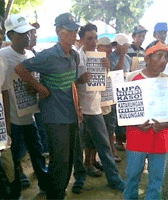Rosselynn Jae García de la Cruz
2010 Asia JusticeMakers Fellow, Philippines

Born and raised in the Philippines, Rosselynn Jae García de la Cruz is dedicated to helping agrarian communities assert and maintain their rights. Rosselynn graduated from the University of the Philippines with degrees in Journalism in 2001 and Law in 2005. She passed the Philippine Bar in 2006, and has been working in rural areas with farmers in the assertion of their rights.
She is “deeply enriched by [her] work and remain[s] constantly humbled by the depth and wisdom emanating from the grassroots.” Her first exposure to the issues confronting farmers was in Bondoc Peninsula, Quezon, where she joined an observers’ mission. She witnessed the scale of injustice being perpetrated against the farmers, and decided to take on their cause.
Rosselynn is a legal consultant with the AKBAYAN Citizens Action Party, a national political party with two seats in the Philippine Parliament. She provides input on its legislative initiatives in the area of rural development and agrarian reform. She also works for Rural Poor Initiatives for Land and Human Rights, providing direct legal services to partner agrarian farmer organizations all over the Philippines. The focus of her project in Bondoc Peninsula, Quezon and Carles, Iloilo, is to address the hotbed of agrarian violence and criminalization that currently exists
In 2007, farmers’ organizations from all over the Philippines registered their objection to the Agreements entered into by the Philippines and China to lease one million hectares of agricultural land, because it threatened to displace farmers. In addition to filing a case in the Supreme Court, Rosselynn launched a campaign to generate public awareness. The contracts have since been suspended.
The Problem
Farmers have been harvesting the land all their lives; when the farmers began to assert their land rights under the government’s agrarian reform program the Filipino government began arresting farmers and charging them with theft for harvesting coconuts. In one region, Iloilo, more than thirty criminal cases have been documented—ranging from Qualified Theft to Malicious Mischief to Trespassing. Rosselynn noted that there is “no clearer or more poignant example of the criminal justice system being used as a tool to further marginalize the already marginalized” than the farmers being arrested in this way. Rosselynn has identified four key problems leading to the denial of legal rights of the accused in agrarian communities: 1. outdated laws allowing harassment and intimidation of farmers, 2. discrepancies between the landowners and the farmers regarding access to legal services, 3. complicit participation of the authorities in the landowners’ harassment 4. the alienation of the farmers (most of whom are illiterate and unschooled) from the legal process.
Rosselyn’s project aimed to confront each of these problems by empowering the women in agrarian society. For her project, she gave a basic, four-day paralegal training to rural women from agrarian hot-spots, and the training calling it the WARRIOR CLASS (Women Advocates for Rural Reforms and the Institutionalization of Rights Class. The training included instruction on the legal system, the criminal justice process, affidavit drafting, record-keeping, and best practices in engagement with the police and the courts. The goal was that these women to be able to fight against arbitrary government actions. Paralegals can assist farmers in navigating the legal system, helping to determine if a lawyer is necessary. Women, a traditionally marginalized segment of society have become empowered and important citizens within their communities.
Results
The Paralegal training organized by Miss de la Cruz had a significant impact in the rural communities in Iloilo and Quezon. Firstly, the women were provided with the necessary legal skills to defend themselves in court. In addition, Miss de la Cruz observed a positive change in attitude towards women’s role in society. In particular, husbands started to treat women in a more respectful manner.
It should also be highlighted that Miss de la Cruz and her team managed to obtain the dismissal of several cases which were pending against farmers in the aforementioned communities. During the implementation of the Project Miss de la Cruz received the support of local NGOs and Governmental Institutions such as the National Anti-Poverty Commission and the Department of Agrarian Reform.